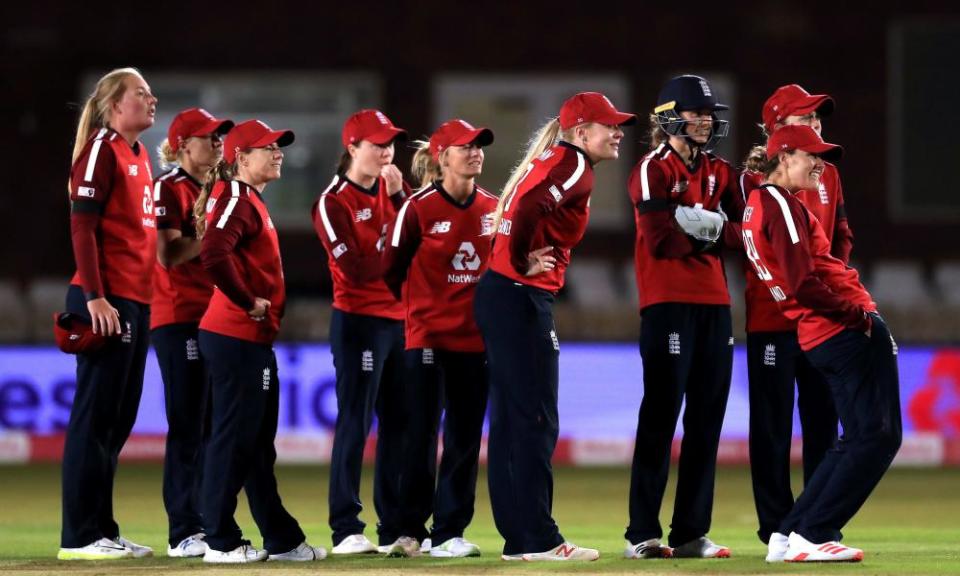England cricketers' win bonuses slashed by half in ECB cuts

The England men’s team have agreed to their win bonuses being slashed in half as part of an overall 15% cut to their pay package for the next 12 months.
After losses of £100m this year and more pain expected in 2021, the England and Wales Cricket Board has secured the first reduction in money paid to England’s men since central contracts were introduced 20 years ago, with win bonuses taking the greatest hit percentage-wise.
Previously the England team earned between £44,100 and £176,400 per Test win depending on where the opposition sit in a five-tier system drawn up by the ECB. For an outright series win they receive an additional bonus that sees the figure for one win multiplied by the number of matches played.
The system means, for example, a 3-0 Ashes win over Australia (the sole team in tier one) would see the players split £529,200 for the three wins and then £882,000 for claiming the five-match series overall, making a total prize pot of £1,411,200.
Related: It is still a golden age to play cricket despite England stars' financial hit | Vic Marks
A similar calculation is in place for bilateral white-ball cricket, where the team’s win bonus per match ranges from £11,000 to £58,800 depending on format and opposition. But with English cricket needing to adjust to the financial challenge of the Covid-19 pandemic – and the ECB having already announced that 62 jobs are being lost – these bonuses are now understood to be cut in the region of 45-50%.
The recent round of central contracts announced for 2020-21 will likely come down in value by around 15% once signed, with Test deals previously worth up to £650,000 per year and their white-ball equivalents about £250,000 (albeit with an element based on performances, appearances and fitness levels).
On top of this come match fees – up to £14,500 per Test and £4,500 per white-ball game – and tour fees, calculated by number of fixtures, which are both expected to be trimmed by a similar amount. Factoring in all these elements will mean some players see their typical annual money hit by a six-figure reduction.
England’s women, whose salaries are understood to range between £30,000 and £60,000, are on contracts that run up to May but the expectation here is they will remain unaffected by the cuts given the current disparity and an overall desire to see them rise further across time.

A statement from ECB and the Team England Player Partnership on Friday morning confirmed a deal had been struck, with Ashley Giles, the director of England cricket, noting the leadership of his Test and white-ball captains during the negotiations.
Giles said: “I would like to thank the players and TEPP for their collaboration, which has enabled us to reach this agreement. “The relationship with our men’s players and their representatives (TEPP) is strong, and we need to recognise that our players, led by captains Joe Root and Eoin Morgan, have conducted themselves with great maturity and responsibility throughout this challenging time.“We now want to build on this agreement and work together on a number of areas relating to player welfare, particularly mental health, which remains a high priority for all of us, as we continue to navigate a path through this pandemic.”
At the start of the pandemic England’s men made a collective £500,000 donation to the latter, and various charities, in acknowledgment of the uncertain times.
A similar acceptance of the stark reality was at play during the recent talks, albeit counterbalanced by the additional demands of playing cricket in biosecure bubbles and the fact the international men’s game still commands the bulk of the broadcast revenues.
Asked about the prospect of a drop in pay at the start of this month, Stuart Broad, who is now a Test specialist, replied: “I think 100% there will be pay cuts. The players are very open to that sort of thing. The players are very aware of the situation and, with the ECB having to potentially lose 60-odd staff, it would be wrong that the players stay on a similar pay.”
Chris Woakes, who holds contracts for both red- and white-ball cricket, added: “Us as players realise the fact the game and the ECB have had to take that hit so far this year and we want to limit the damage as much as possible.”
The cuts to bonuses, match fees and tour fees will be felt most by those who are year-round regulars in the Test squad but do not have red-ball central contracts, such as the spinners Dom Bess and Jack Leach, and the fast bowler Mark Wood. It risks reducing the incentive of committing to the longest form of the game and could lead individuals to weigh up white-ball specialism and the money on offer for playing on the arguably less-pressured global Twenty20 circuit.


